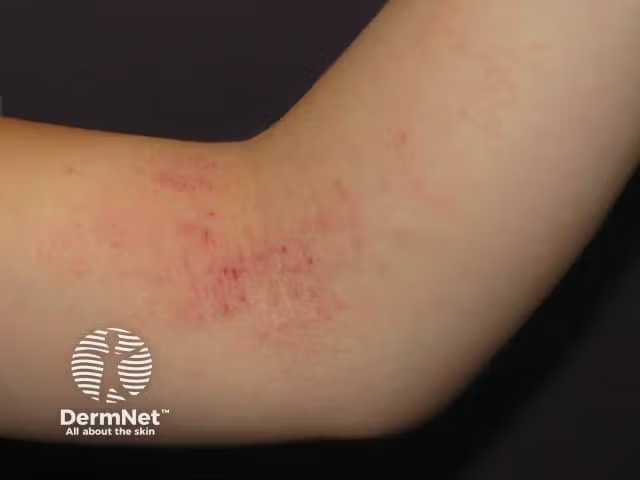- Case-Based Roundtable
- General Dermatology
- Eczema
- Chronic Hand Eczema
- Alopecia
- Aesthetics
- Vitiligo
- COVID-19
- Actinic Keratosis
- Precision Medicine and Biologics
- Rare Disease
- Wound Care
- Rosacea
- Psoriasis
- Psoriatic Arthritis
- Atopic Dermatitis
- Melasma
- NP and PA
- Skin Cancer
- Hidradenitis Suppurativa
- Drug Watch
- Pigmentary Disorders
- Acne
- Pediatric Dermatology
- Practice Management
- Prurigo Nodularis
- Buy-and-Bill
Commentary
Video
Tackling Unmet Needs in Dermatology With Rezpegaldesleukin
Author(s):
Jonathan Zalevsky, PhD, discusses the unmet needs in atopic dermatitis treatment, the potential of Rezpeg, and the importance of novel therapies.
Nektar Therapeutics recently announced that the FDA granted Fast Track designation to its investigational drug rezpegaldesleukin (Rezpeg) for the treatment of atopic dermatitis (AD).1
Read more from Dermatology Times.
In a recent interview with Dermatology Times, Jonathan Zalevsky, PhD, chief of research and development at Nektar Therapeutics, explored the importance of this designation, the unique mechanism of action of rezpegaldesleukin, more. In part 3 of the interview, Zalevsky discusses unmet needs in AD and the potential of rezpegaldesleukin in AD and beyond.
Understanding the Unmet Needs in AD
The first area of unmet need in the treatment of AD, according to Zalevsky, is the lack of robust efficacy for many patients who require systemic treatment. He explained, “If you take the whole cross-section of the atopic dermatitis population that have failed topicals and have advanced to needing a systemic therapy, you really see that roughly half of the people, between 40% to 60%, are not achieving a meaningful clinical response.”
This lack of response is evident in clinical trials, where patients who achieve a 75% reduction in disease severity (EASI-75) are considered to have responded, but even these responses are not seen in all patients.
Zalevsky pointed out, “What you find is that the proportion of people that get to an IGA 0 or 1, or an EASI-90, is pretty small. We're talking, like, 10% to 20%.”
This means that a significant portion of patients are left with inadequate symptom control despite using systemic treatments.
Challenges with Current Therapies
As Zalevsky elaborated, the existing therapies are often more effective for patients with moderate disease but less effective for those with severe forms of AD.
“The current drugs that we have are much more effective for the moderate population, less effective for the severe,” he said. This discrepancy leaves a substantial portion of the AD patient population without effective options.
In addition, the need for long-term use of these drugs introduces another layer of complexity.
“These are drugs that you have to take forever. And it would be great if you had a way to treat a person to a remission, like we do in other diseases,” Zalevsky added, drawing comparisons to other areas of medicine such as rheumatology and gastroenterology where autoimmune diseases can be treated to remission.
Rezpeg’s Potential to Address Unmet Needs
According to Zalevsky, rezpegaldesleukin's novel mechanism of action, which involves modulating the immune response by targeting Tregs (regulatory T cells), could provide a solution for those who have not responded to existing therapies.
“We think that Rezpeg, because of its novel mechanism of action and the role that Tregs can play, you might be poised to really address a lot of those key areas of unmet need,” he said.
Zalevsky emphasized that the potential for rezpegaldesleukin extends beyond AD. The drug has already shown promise in early-phase trials for other inflammatory conditions, such as lupus and psoriasis. These early results have spurred further investigations into the drug's efficacy in inflammatory diseases.
Phase 1b Trials: A Strong Signal for Inflammatory Diseases
The results from the phase 1b trials in AD, lupus, and psoriasis are particularly encouraging. Zalevsky explained, “We clearly see that there is, in inflammatory diseases of different underlying biologies, there’s definitely a strong signal here with this mechanism.”
Looking ahead, Zalevsky is optimistic about the future of rezpegaldesleukin in addressing the high unmet need for AD therapies.
“We’ve had a chance to look at our study results, and we think there’s a lot of potential there,” he said, noting that the drug’s novel approach could add to the dermatology armamentarium and help more patients.
Reference
- Nektar Therapeutics receives fast track designation for rezpegaldesleukin for the treatment of moderate-to-severe atopic dermatitis. News release. PRNewswire. February 10, 2025. Accessed February 14, 2025. https://www.prnewswire.com/news-releases/nektar-therapeutics-receives-fast-track-designation-for-rezpegaldesleukin-for-the-treatment-of-moderate-to-severe-atopic-dermatitis-302371995.html






